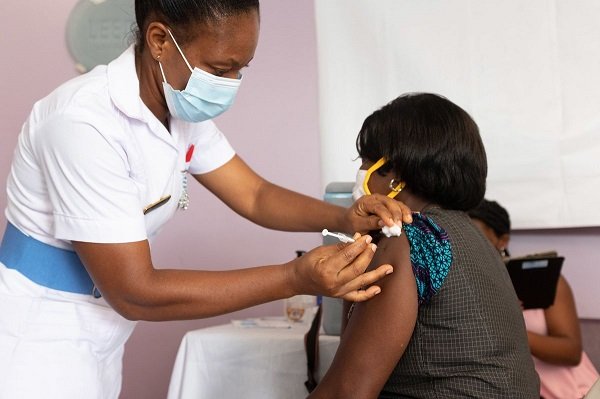Editorial
Make vaccination outlets visible

Dear Editor,
COVID-19 protocols have been eased and the wearing of nose masks is no longer mandatory, as President Akufo-Addo indicated in his last situational address to the nation.
While at it, he encouraged citizens to avail themselves of vaccination for Ghana to attain the 20 million target by July 2022, as the existing number of vaccinated persons was somewhat unsatisfactory.
Apart from apathy on the part of some Ghanaians, I believe limited information on where citizens could voluntarily go and take COVID-19 jab also accounts for the low figure recorded.
It is against this backdrop that I suggest the Ghana Health Service should consider a ‘mobile or door-to-door’ vaccination programme to enable more people take the jab, just as it does to polio vaccination for children.
Following increased public education on the safety and efficacy of the COVID-19 vaccine, I believe many Ghanaians are now willing to take the vaccine; therefore, health authorities must make the vaccination outlets more visible to the public.
Although I may not be too conversant with operations in the health sector, I believe it would not be out of place for the authorities to send mobile vaccination vans to communities or establish more centres closer to residents so they could conveniently take the jab, and in the long run help the country attain its intended vaccination target.
James Gakpo,
Tema, Community 4.
Editorial
Parents urged to take responsibility for sex education
Dr. Francis Wuobar, a Gynaecologist at the Eastern Regional Hospital in Koforidua has urged parents to take the lead in providing sex education to their children, stressing that they were in the best position to guide them through the changes of adolescence.
According to him, sex education remained a taboo subject in most Ghanaian homes, a culture that must change to prevent children from seeking misleading information elsewhere.
“With the evolving nature of society and technological advancements, today’s children will either learn about sex on the internet or from their peers, who may offer wrong advice,” he cautioned.
Dr. Wuobar noted that the health system and society often concentrate on the reproductive stage of life, neglecting the adolescent and menopausal phases.
“When a woman reaches the reproductive period and gets pregnant, everyone rallies around her. But before that stage, during adolescence, there is little attention and guidance, which has contributed to the rising cases of teenage pregnancy,” he explained.
He observed that many adolescents lack access to counseling and adolescent clinics, creating a vacuum that forces them to explore on their own.
“The answers they seek, adults and parents are not willing to provide. Their peers, who are equally uninformed, become their only source of advice. This exploration is one of the major contributors to teenage pregnancy,” he said.
Dr. Wuobar therefore called on parents to create open and confidential spaces for discussion, where children can freely ask questions about sex, puberty, and relationships.
He emphasized that parents must help adolescents understand the consequences of unprotected sex, the changes they go through, and what choices were right or wrong.
“Today’s generation is curious and asks questions, unlike in the past when children were silent. Parents should not rebuke them but rather engage them seriously and guide them through this turbulent stage,” he advised.
He further appealed to the health sector to establish more adolescent clinics across the country to give young people safe spaces to seek information and counseling.
That, he said, would help reduce the high incidence of teenage pregnancy and support adolescents in making informed decisions about their sexual health.
From Ama Tekyiwaa Ampadu Agyeman, Koforidua
Editorial
Addressing unhealthy conditions at Akropong Mandela Market

Dear Editor,
The Akropong Mandela Market, a vibrant centre of commerce, has been in a terrible state for over a decade now.
Central to the problem is a public toilet located near the market, which has become a breeding ground for diseases and a source of discomfort for both food vendors and customers.
This toilet, utilised by everyone in the town, is positioned too close to the market, severely affecting the vendors who spend long hours selling their goods.
They are constantly exposed to unsanitary conditions mixed with foul odours emanating from the facility.
Agnes, a vendor at the market is sad about the apparent lack of concern from those responsible for maintaining the toilet. Despite collecting user fees, there seems to be little effort to keep the facility clean and hygienic.
The situation at the Akropong Mandela Market highlights the urgent need for effective waste management and sanitation infrastructure in public spaces.
Authorities must take immediate action to ensure the facility is regularly maintained and cleaned. Vendors and customers deserve a safe and healthy environment to conduct their daily activities.
In the meantime, the vendors are urging local government officials to intervene and find a lasting solution to this problem.
Only through collective action can the health and well-being of both vendors and customers be safeguarded to restore the Akropong Mandela Market to its former glory as a thriving commercial hub.
Addo Sarah Ansah Student,
UNIMAC–IJ(BACS26275)
Join our WhatsApp Channel now!
https://whatsapp.com/channel/0029VbBElzjInlqHhl1aTU27






